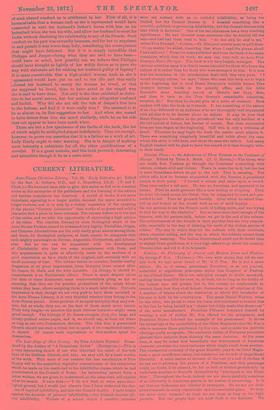The Last Days of Pere Gratry. By Pere Adolphe Perraud.
Trans- lated by the Author of "A Dominican Artist." (Rivingtons.)—This is a very interesting sketch of one who inherited the spirit of the beet days of the Gallic= Church, and done, we may add, by a hand worthy of the work. With most of our readers the last recollection of Pere Gratry will be the soniewhat regretful remembrance of the submission which he made on his death-bed to the infallibilist dogma which he had controverted at the Council of Rome. An interesting extract from a letter written, we are given to understand, at the same time, will explain what he meant. It runs thus :—" I do not wish to enter upon theo- 'ogles] ground, but I would just observe that I have withstood the doe- _iae of inspired infallibility, and this the Council rejects. I have fought against the doctrine of personal infallibility,—the Council decrees offi- cial infallibility. Writers of a school which I consider extreme were not content with an ex cathedrte infallibility, as being too limited, but the Council decrees it. I dreaded something like a scientific, political, or governing infallibility; but the Council decrees only that which is doctrinal." One of his last utterances has a very touching significance. He had dictated some sentences—for he worked till the last—and had had them read to him. "At the end, he said to me, writes Pere Perraud, " Ajoutez,—Et Dieu pent mourir pour ce aims. Ce au neutre,' he added, observing that when I read the phrase aloud I had said ceux." From the same publisher and from the hand of the same translator, which does its work, wo may say, very well, we have Pere Gratry'a Henri Perreyve. The book is not very happily arranged. The obvious criticism upon it is that it seems intended for those who knew the subject of it rather than for those who were strangers to him. It is true that the translator in his introduction deals with this very point. "I would strongly advise," he says, "those who read this book not to begin at the beginning, but to read Henri Perroyve's forcible letters, Pere Gratry's fervent worda in the priestly office, and the Abbe Bernard's most touching record of Henri's last days, first, and then to turn to the Pere Gratry's remarkable education, vocation, &e But then he should give us a table of contents. Most readers will take the book as it stands. It has something of the nature of an doge delivered to an audience w ho are thoroughly well acquainted with all that is to be known about its subject. It may be true that Henri Pereyve's vocation to the priesthood was the only incident of a life full indeed of labour, but barren of events. But even uneventful lives are beet began at the beginning. Still this is only a criticism of detail. Wherever he may begin the book the reader must admire it. There was something singularly beautiful and noble about the man whose life-story is told here, and about the man who tells it. And many English readers will be glad to have the record of it thus brought with- in their reach.


































 Previous page
Previous page